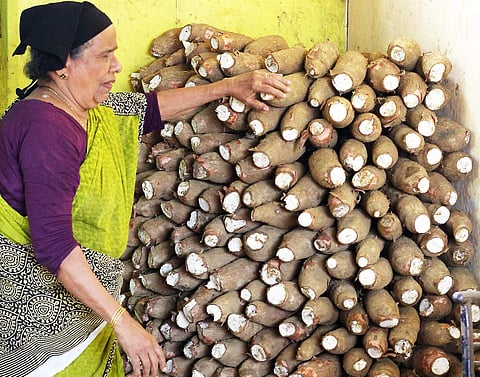

BENGALURU: Heard about crop diplomacy? It exists.
In a recent case, the International Institute of Tropical Agriculture (IITA) in the Republic of Benin, West Africa helped India salvage its tapioca crop in Tamil Nadu and Kerala, which was infested with a foreign crop pest - Cassava mealybug - by exporting beneficial parasitoid, Anagyrus lopezi (Phenacoccus manihoti Matile-Ferrero).
India is the number one producer of tapioca (fresh tubers) in the world with 35 tonnes/hectare as against the world average of 10.76 tonnes/hectare, and exports around Rs 200 million worth of value-added cassava products every year to the Gulf and other countries.
"We got the parasitoid Anagyrus lopezi in August 2021 and released it recently after mass production to tapioca farmers in Yethapur and Salem in TN after following due protocols in safety, quarantine and specificity trials of the bioagent," said Dr AN Shylesha, principal scientist and Head of the Department, GermPlasm Conservation (GPC) & Utilization, National Bureau of Agricultural Insect Resources (NBAIR), Bengaluru.
He is the principal investigator in the casava mealybug project and has senior entomologists Dr Sampath Kumar and Dr Mohan Kumar in his team.
Casava mealybug is one of the most destructive pests of tapioca in the world and native to South America.
"It came to India in 2020 through an unknown source. It multiplied very fast and had destroyed 80 percent of the tapioca crop in TN and Kerala. (The cassava mealybugs infested plant produces only rudimentary tubes, therefore, causing yield losses to the tune of 70-80 percent). The situation had become so severe that the farmers were thinking of replacing the crop with a substitute crop," said Shylesha.
The entomologists at NBAIR scanned the literature and came to know that Thailand had this mealybug infestation some years ago and had used the parasitoid Anagyrus lopezi for its bio-control. It was then taken to Africa, where it was used for the same purpose.
"We hence approached Thailand for the parasitoid but because of the Covid-19 pandemic and some other prevailing issues there they could not release it to us. We then contacted Dr Georgian of IITA, Benin and they helped us," added the chief entomologist.
"The parasitoid is working very well at both these places, where it was released," said Director, NBAIR, SN Sushil. He explained that in the absence of an effective indigenous bioagent to control crop infestation, a request for importing a bioagent is placed before the Directorate of Plant Protection, Quarantine & Storage (DPPQS), Government of India.
"There are stringent regulations for import of plant and plant products under the Plant Quarantine Order, 2003," he added.
India can export Anagyrus lopezi parasitoid to neighbouring countries in the case of mealybug infestation there as part of the international protocol of exchange of bioagents subject to clearance from the National Biodiversity Authority (NBA) for export of live material.